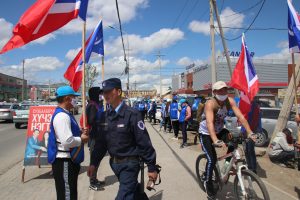Mongolia conducts parliamentary elections on Wednesday, upholding a nearly 30-year democratic system in a vast but lightly populated country sandwiched between authoritarian regimes in Russia and China and beset by economic problems.
Mongolia is the second country after South Korea to hold national elections during the coronavirus pandemic. It has closed borders and forced many to stay home to avoid infection. The parliamentary elections are the country’s eighth since it adopted a new constitution in 1992 at the end of more than 60 years of Communist rule.
The Mongolian People’s Party is seeking to retain the 65 seats it won in the 76-seat State Great Khural in a landslide victory in 2016 under a one-representative-per-district system. Election rules have been revised this year to allow two to three members of parliament to be elected from a single district, resulting in 670 candidates running in 29 constituencies.
Urban areas in the largely rural country are the most hotly contested, with 28 candidates running in one district of the capital, Ulaanbaatar, where roughly half the national population of 3 million lives.
Public services are a key issue, especially in slum communities that ring the city, which offer little in the way of services such as electricity and sewage treatment.
More than 30 percent of Mongolia’s people live below the poverty line, and growing income inequality and social injustice are fueling resentment against authorities and major political parties.
That could boost the odds for outsider candidates such as Munkhsoyol Baatarjav of the “Right Person, Right Electorate” coalition, who says the MPP and its chief rival, the Democratic Party, have left a legacy of economic mismanagement and corruption.
“It is time for new and able people to come to the political scene,” Baatarjav said. “New people from a new generation with clean reputations and morals can move the country forward,” she said.
Landlocked Mongolia boasts vast mineral wealth but has struggled to attract foreign investment because of plunging commodity prices and high-profile disputes between the government and large investors such as mining giant Rio Tinto.
Corruption and a bulging national debt of about $23 billion, or twice the country’s annual economic output, have also been a major drag on the economy.
Both the MPP and the Democratic Party are a running a full slate of candidates. A coalition between the Mongolian People’s Revolutionary Party and the Civil Will Green Party is also running in all districts, while the National Labor Party, the New Party, smaller coalitions, and independents are also contesting seats, with many of their candidates young and foreign-educated.
For the MPP, the election is about “seeking citizens’ confirmation of the government’s effectiveness in the past four years,” said Julian Dierkes, an expert on Mongolian politics at Canada’s University of British Columbia. “Other parties and candidates are casting the election as a referendum on longer-term trajectories and trends.”
The participation of so many first-time candidates, despite their slim chances of winning, signifies frustration with the two dominant parties and the corruption associated with them, Dierkes said. The challenge will be in maintaining the momentum for real change, he said.
“If their participation spurs a change in political culture toward more issue-orientation and policy debates, Mongolians may also see benefits. However, if these first-time candidates withdraw from political life after the election, the chance of Mongolian democracy backsliding seems significant,” Dierkes said.
Among the MPP’s candidates are current Prime Minister Ukhnaagiin Khurelsukh, Cabinet Secretary Luvsannamsrain Oyun-Erdene, and former presidential candidate Badmaanyambuugiin Bat-Erdene. The head of state, President Khaltmaagiin Battulga of the Democratic Party, elected in 2017, is not on the ballot.
Election rules require that at least 20 percent of candidates nominated by parties or coalitions be women, and while the major parties have an advantage in political funding, less well-known candidates have used social media to raise their profiles.
While candidates differ little on substance, there is a generational change among voters and candidates, and a strong backlash against perceived corruption among the ruling parties. Under the new election rules, only four members of parliament can also be cabinet ministers in an attempt to separate politics and governance.
The MPP is expected to make a strong showing after proving itself largely competent in dealing with Mongolia’s many challenges and firmly handling the country’s COVID-19 outbreak, in which only about 200 imported cases have been recorded with zero deaths. However, the country’s financial woes and fickle prices for its commodities such as copper, along with air pollution in Ulaanbaatar and a lack of jobs, could help the DP make gains despite considerable infighting among its members.

































